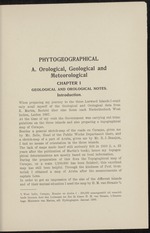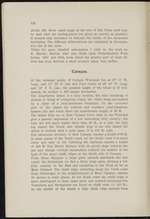| 1 |
 |
“...PHYTOGEOGRAPHICAL
A. Orological, Geological and
Meteorological
CHAPTER I
GEOLOGICAL AND OROLOGICAL NOTES.
Introduction.
When preparing my journey to the three Leeward Islands I could
only avail myself of the Geological and Orological data from
K. Martin, Bericht fiber eine Reise nach Niederiandisch West
Indien, Leiden 1887.
At the time of my visit the Government was carrying out trian-
gulations on the three islands and also preparing a topographical
map of Curagao.
Besides a general sketch-map of the roads on Curagao, given me
by Mr. Zelle, Head of the Public Works Department there, and
a sketch-map of a part of Aruba, given me by Mr. R. J. Beaujon,
I had no means of orientation in the three islands.
The lack of maps made itself still seriously felt in 1910 (i. e. 23
years after the publication of Martin’s book); hence my topogra-
phical determinations are mostly based on local information.
During the preparation of this flora the Topographical map of
Curagao, on a scale 1/200.000 has...”
|
|
| 2 |
 |
“...126
About the three small maps at the end of this Flora need only
be said that the finding-places are given as exactly as possible;
it seemed only necessary to indicate the border of the calcareous
territories. The different abbreviations are explained in the exten-
sive list of the sites.
While for more detailed information 1 refer to the work by
K. Martin: Bericht fiber eine Reise nach Niederlandisch West
Indien 1887 and 1888, from which the greater part of what fol-
lows has been derived, a short account many here suffice.
Curagao.
Of the terminal points of Curagao Westpunt lies at 69° 11' W.
Long, and 12° 23' N. Lat. and Punt Canon at 68° 49' W. Long,
and 12° 3' N. Lat.; the greatest length of the island is 58 kilo-
metres, its surface + 450 square kilometres.
The long-drawn island is a hilly country, the hills consisting of
diabase or being of cretaceous origin, the whole being surrounded
by a layer of a coral-limestone formation. On the narrower
part of the island the nothern and...”
|
|
